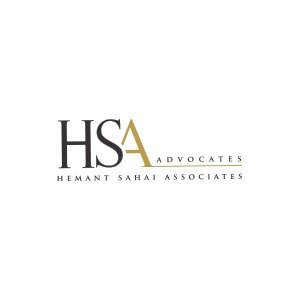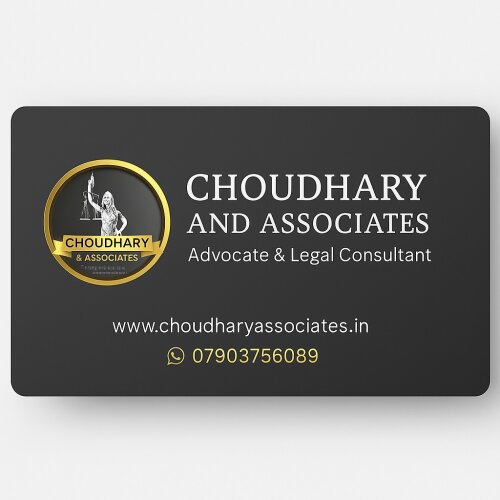Best Ethics and Professional Responsibility Lawyers in India
Share your needs with us, get contacted by law firms.
Free. Takes 2 min.
Or refine your search by selecting a city:
List of the best lawyers in India
About Ethics and Professional Responsibility Law in India
Ethics and Professional Responsibility in India entail principles and guidelines that govern legal and professional conduct. These rules are designed to ensure accountability and enhance public confidence in various professions. Ethics aim to set standards within a profession, while professional responsibility refers to the duties required by law for various professionals to act in a manner that is honest, transparent, and in their client's best interest. In India, professional ethics have a profound influence on legal and corporate practices, wherein statutes and regulatory bodies lay the foundational guidelines professionals need to adhere to.
Why You May Need a Lawyer
There are several scenarios where individuals and organizations might require legal help in the field of Ethics and Professional Responsibility:
- Allegations of unethical practices or professional misconduct
- Understanding compliance requirements for a specific profession
- Legal disputes related to breach of ethical guidelines
- Advisory services for drafting company policies on ethical practice
- Defense against disciplinary actions imposed by governing bodies
- Guidance on ethical dilemmas faced during professional duties
Hiring a legal expert ensures professional advice and representation suited to the intricate laws that govern ethics and responsibilities.
Local Laws Overview
The local laws governing professional ethics and responsibility in India are diverse and depend on the specific profession:
- The Advocates Act, 1961: Oversees legal practitioners, focusing on maintaining the dignity and ethical practice by advocates.
- The Companies Act, 2013: Involves corporate governance, ethical practices, and compliance for businesses.
- The Medical Council of India Act: Governs medical professionals adhering to ethical norms and conduct.
- Employee Codes of Conduct: These are often drafted based on the overarching principles provided by local or international standards.
The Bar Council of India, the Institute of Chartered Accountants of India (ICAI), and other professional organizations are key enforcers of these ethical guidelines.
Frequently Asked Questions
What defines professional misconduct in India?
Professional misconduct refers to unethical or improper conduct that deviates from the accepted professional standards.
Who regulates legal ethics in India?
The Bar Council of India is the primary regulatory body responsible for governing legal ethics and conduct of advocates.
Can a lawyer represent a client in cases of ethical misconduct?
Yes, a lawyer can offer legal representation and defense services for clients facing allegations of ethical misconduct.
How is ethical compliance enforced in the corporate sector?
It is enforced by regulatory bodies like the Securities and Exchange Board of India (SEBI) and through corporate governance frameworks outlined in the Companies Act, 2013.
What is the role of ethics in the medical field in India?
The Medical Council of India ensures that medical professionals adhere to ethical norms, safeguarding patient welfare and medical practice integrity.
Are there consequences for breaching professional ethics?
Yes, there can be disciplinary actions, fines, suspension, or revocation of licenses depending on the severity of the breach.
Do companies need to have an ethics policy?
Many companies create ethical policies to ensure compliance and set clear guidelines related to business ethics for their employees.
How does one find a lawyer specialized in professional ethics?
Individuals can seek referrals from professional organizations or use online platforms and directories to find specialized legal practitioners.
What is considered unethical practice in law?
Unethical practices in law include conflict of interest, breach of client confidentiality, misrepresentation, and corruption.
Why are professional ethics important?
Professional ethics foster trust, integrity, and transparency in professions, which are essential for maintaining public confidence and legal compliance.
Additional Resources
Here are some helpful resources for someone seeking advice on Ethics and Professional Responsibility:
- Bar Council of India
- Institute of Chartered Accountants of India (ICAI)
- Medical Council of India (MCI)
- Ethical guidelines and statutory requirements available on government portals
- Consultative services from renowned law firms specializing in compliance and ethics
Next Steps
If you require legal assistance regarding Ethics and Professional Responsibility, consider the following steps:
- Assess the nature of your requirement or issue concerning ethics.
- Research and shortlist legal experts or law firms specializing in professional ethics.
- Schedule consultations to discuss your case and understand your legal options.
- Ensure the lawyer or law firm is well-versed with the specific ethical laws relevant to your profession.
- Comply with all preliminary legal advice and documentation requirements as provided by your legal counsel.
Taking prompt and informed legal action can help effectively address issues related to Ethics and Professional Responsibility and ensure professional compliance.
Lawzana helps you find the best lawyers and law firms in India through a curated and pre-screened list of qualified legal professionals. Our platform offers rankings and detailed profiles of attorneys and law firms, allowing you to compare based on practice areas, including Ethics and Professional Responsibility, experience, and client feedback.
Each profile includes a description of the firm's areas of practice, client reviews, team members and partners, year of establishment, spoken languages, office locations, contact information, social media presence, and any published articles or resources. Most firms on our platform speak English and are experienced in both local and international legal matters.
Get a quote from top-rated law firms in India — quickly, securely, and without unnecessary hassle.
Disclaimer:
The information provided on this page is for general informational purposes only and does not constitute legal advice. While we strive to ensure the accuracy and relevance of the content, legal information may change over time, and interpretations of the law can vary. You should always consult with a qualified legal professional for advice specific to your situation.
We disclaim all liability for actions taken or not taken based on the content of this page. If you believe any information is incorrect or outdated, please contact us, and we will review and update it where appropriate.
Browse ethics and professional responsibility law firms by city in India
Refine your search by selecting a city.















